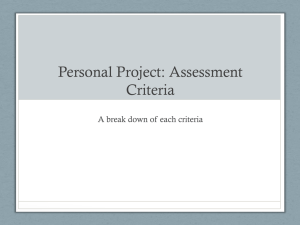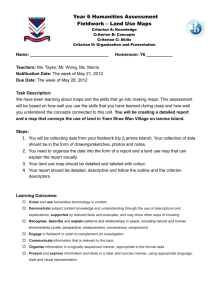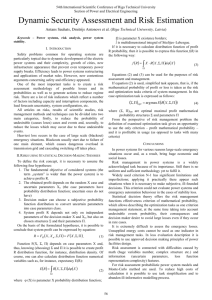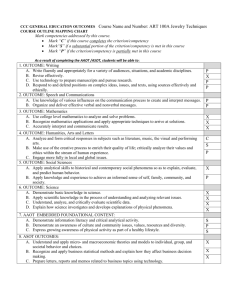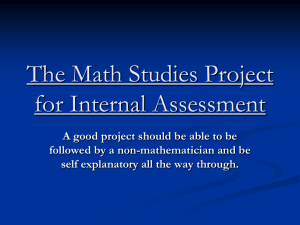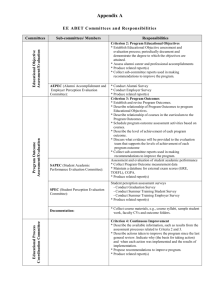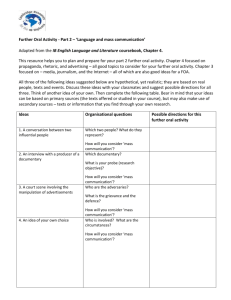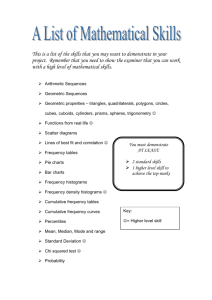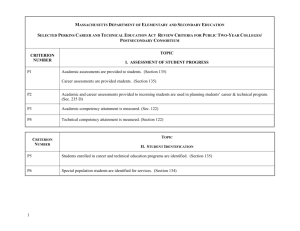Math Studies IA Project Guidelines
advertisement
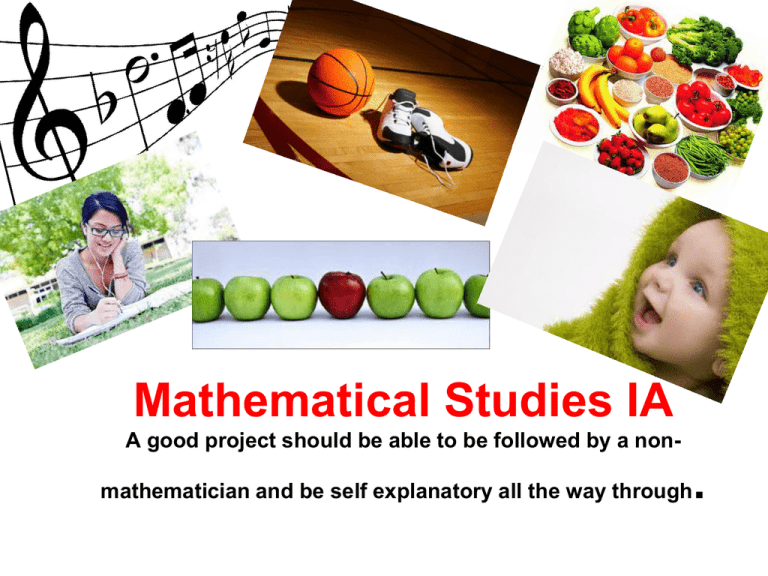
Mathematical Studies IA A good project should be able to be followed by a nonmathematician and be self explanatory all the way through . Math Studies Assessment Purpose of the Project It enables students to demonstrate the application of their skills and knowledge and to pursue personal interest, without time limitation and other constraints often associated with written exams. It is a piece of written work based on personal research involving collection, analysis and evaluation of data. Develop students’ abilities to ask their own questions about mathematics. Encourage students to initiate and sustain a piece of work. Enable students to acquire confidence in developing strategies for dealing with new problems. Enable students to experience mathematics as an integrated discipline See connections and applications of math to other areas of interest. Allow students with varying abilities, interests and experiences to achieve a sense of personal satisfaction in studying mathematics Requirements The project is a piece of work based on personal research, analysis and evaluation of data. Each project must contain: • A title • A statement of the task • Measurements, information or data • Analysis of the information, measurements or data • Evaluation of the analysis • Bibliography and footnotes, as necessary Length The project should be no longer than 2000 words, excluding diagrams, graphs, charts and tables. However it is the quality of the work which is most important. Criterion Criterion A (0-3) Introduction Criterion B (0-3) Information/Measurement Criterion C (0-5) Mathematical Processes Criterion D (0-3) Interpretation of results Criterion E Criterion F (0-1) Validity (0-3) Structure and Communication Criterion G (0-2) Notation and Terminology Introduction • Your introduction should include: • A Title page with Title of your project; your name; teacher’s name; IB candidate number • A clear but brief description of your project • Description of the steps you will take • (make sure it includes what you are going to do and how you will do it – the intro can be written after the rest of the project) Information/Measurement • Collect sufficient data to be able to draw conclusions from it • Organise your data in a logical fashion • Verify the accuracy of your data (this is difficult if you do a survey of your peers – how do you ensure random sampling) • Confirm that data is relevant • Provide a copy of raw data/questionnaire as appendix Mathematical Processes • Choose techniques that are appropriate • Verify/check your results to confirm there are no errors in your calculations • Use both simple and sophisticated processes • Explain the relevance of your processes Interpretation of Results • Provide explanations of what your calculations show • Give enough detail in your interpretation so that a reader would agree with your conclusion Validity • Valid means does the project do what it set out to do? • Are your conclusions accurate – maybe quote similar research • Perhaps comment on how you could improve your project Communication • Suggested order: Title page Introduction Organised data Mathematical processes Interpretation of results Discussion of validity Appendices (if required) Bibliography • Include footnotes as necessary and cite your sources • Have someone else read your project for flow/readability, someone who is not familiar with this course Project ideas Choose something in which you are interested; for which you will be able to gather data; that there are mathematical processes simple and sophisticated which are relevant. Suggestions: • • • • • • • • • • • • • • • • • • • • • • Are yellow M & M’s less common than other colours? Does location affect the local rate of suicides? Does that amount of water plants get affect their rate of growth? What is the relationship between GNP and AIDS infection rates? How quickly does water drain from a bucket? How long does it take for a cup of coffee to cool to room temperature? What is the pattern in the rise and fall of tides? What is the stopping distance of a particular car? Analysis of stock market fluctuations A comparison between calorie intake and gender Does eating breakfast have any effect on high school grades? Infant mortality and GDP Investigation of reaction times Comparison between lung capacity, age weight and body fat Calculating the time of sunrise and sunset Gender based discrimination Sports and grades Bat speed compared with body weight Air travel – distance compared with price Cost efficiency of vehicles Sine waves in pitch frequencies Mobile phone charges in different countries

